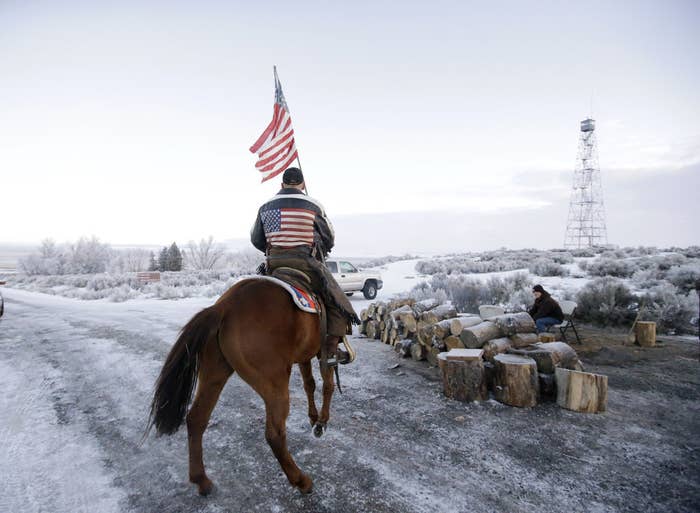
Five days after a group of armed militia members and ranchers took over a federal wildlife refuge in rural Oregon, one of the occupiers sat outside in the cold and said he'd rather die than go to jail.
"There are things more important than your life and freedom is one of them," LaVoy Finicum told NBC News.
The comment from the 54-year-old Mormon rancher from Arizona was not necessarily unusual for the standoff, but it is significant for another reason: It might as well have come straight out of Finicum's bloody, post-apocalyptic novel, Only by Blood and Suffering: Regaining Lost Freedom.
Finicum's book, published in August and reviewed this week by BuzzFeed News, tells the story of the Bonham family, Utah-based ranchers living in the near-future when a nuclear attack — possibly from Russia or China — has precipitated social collapse. The first chapters recount how the Bonhams converge on the family homestead — witnessing murder, rape, and cannibalism along the way — while the later portions are about a "war" between well-armed, well-prepared ranchers and their short-sighted neighbors and government agents.
The ranchers, and particularly protagonist Jake Bonham, are the heroes of the story as they take a stand against tyranny — and shoot many of those who oppose them.
As a work of fiction, it's not necessarily a given that everything in the book is a reflection of the author's views. BuzzFeed News reached out to Finicum about the novel but was told he would be unable to discuss it until the situation at the wildlife refuge was resolved.
Still, many scenes in the book bear a resemblance to what is going on in Oregon, and the characters repeatedly make comments that could have come out of the standoff. Finicum also suggests a didactic purpose for the novel in the author bio, revealing he wrote the book to "show that certain truths are 'self-evident' and that our rights come to us from God and are 'inalienable.'"
Only by Blood and Suffering portrays a future that vindicates the worldview of the Oregon occupiers. It's a future defined by government overreach and cowboy justice, and the parallels to real life offer a unique glimpse into the values at play in the standoff. There is, however, one big difference: The end of the book is a bloodbath.
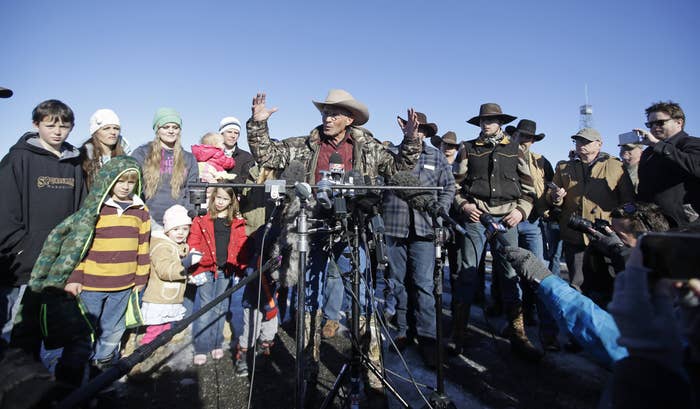
One of the book's central themes is gun control, and it heaps criticism on efforts to restrict access to firearms.
In the future the book describes, people have been forced to turn in their guns.
"Before our previous President had finished his last term in office, gun control was the law of the land," the book states. "With the new appointments in the Supreme Court it had moved hard left. The new Court upheld the President's executive orders, which consolidated even more power in the executive branch of government."
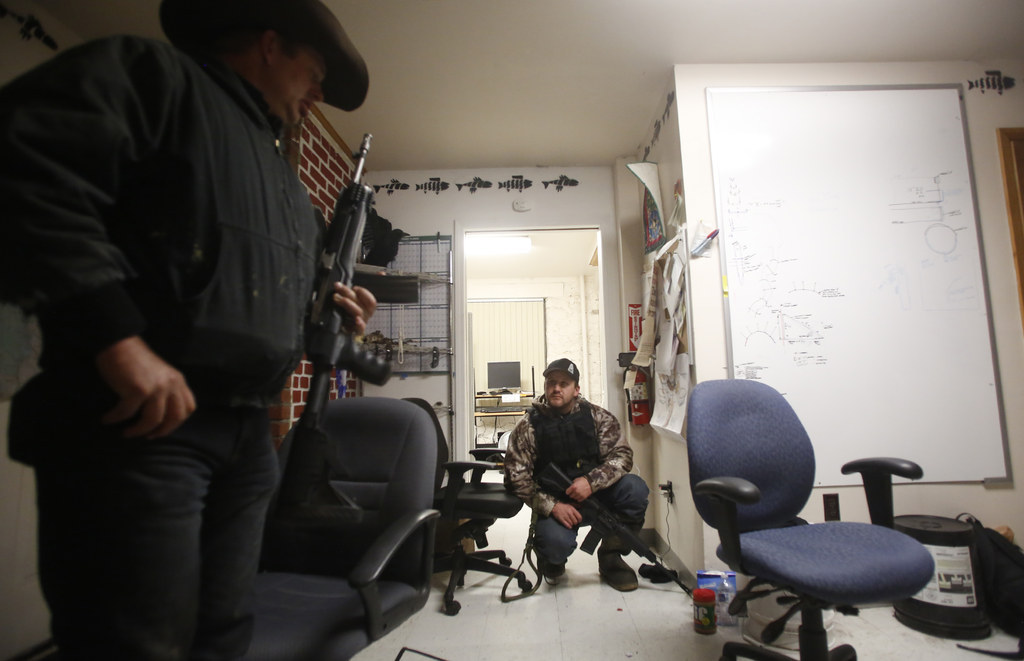
The president in the story is never named, though it does mention people wanting to "cling to their God and guns" — a reference to a comment Obama made in 2008.
Eventually in the book, a rogue Department of Homeland Security agent forces people at gunpoint to give up their firearms. When one man resists, an agent shoots him in the head.
The heroes of the story refuse to surrender their guns, and consequently are able to kill the neighbors and government agents who come to take their supplies by force. The book goes into great detail about the protagonists' arsenal, which includes an array of pistols, AR-15 rifles, and other guns — all of which are pivotal to their triumph.
The government in the book is the embodiment of greed, deception, and treachery.
The characters repeatedly lament what they see as the U.S. abandoning the Constitution. They note that "almost no politician considered the Constitution to be the supreme law of the land anymore," and that the "Supreme Court had paid lip homage to the Constitution and the Founding Fathers while at the same time shredding the tattered document even more."
The novel also criticizes the U.S. Food and Drug Administration's "rampage against raw milk," public schools, national debt, and various federal programs.
"The simple mathematical facts that a program such as social security could not be financially sustained, were always dismissed," the book states. "Step by step they had been able to change the culture of America until Americans willingly gave up bucket loads of freedom and swallowed such things as nationalized health care."
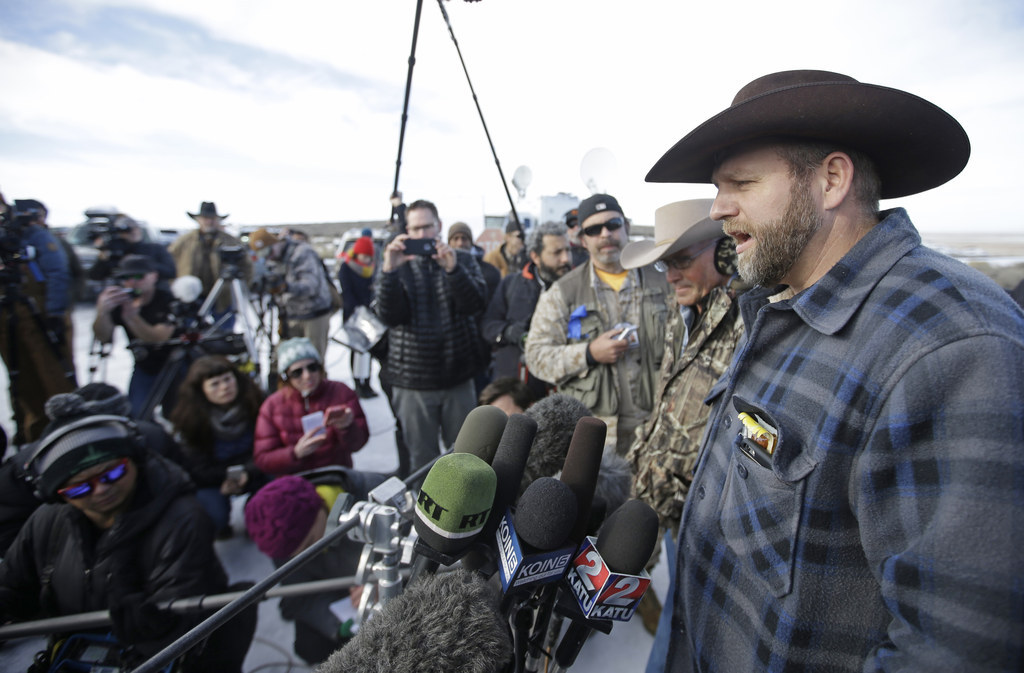
A scene in which Bonham family members bicycle passed a group of refugees also paints a dire picture of people who trusted the government:
"They were sheep waiting for a shepherd that would not come. How many generations had it been, as the quiet beat of government drums grew ever louder, beating out the mantra, 'We can help, we can make it fair, you can trust us.' The 'Good Government Shepherds' were not here for these sheep and in the days and weeks to come they would be torn by wolves."
Another government-related theme in the book is nuclear disarmament, which it pointedly criticizes again and again, saying that "Russia and China are increasing the pace of their nuclear weapons build up while the U.S. is unilaterally disarming its own."
"What fools in Washington thought that by unilaterally disarming ourselves it would make the rest of the world like us more?" Cat, a woman in the Bonham family, wonders. "There were actual fools in Washington but there were also traitors."
Probably the harshest criticism is saved for the U.S. Department of Homeland Security. The main villain, Zachary Williams, is a DHS agent who conscripts an army of convicted felons and spearheads a plan to turn the region around southern Utah and northern Arizona into a kind of fascist kingdom.
In the final pages of the story Williams nearly wins; Bonham is wounded, surrounded, without a rifle, and Williams talks about "taking your head." At the last second, however, Bonham pulls out his revolver and kills Williams and several other agents.
"The bullet took Zachary Williams between the eyes," Bonham narrates, adding a few lines later that "The bodies of my enemies lay before me, not a twitch coming from them. Holding the old revolver in my hand, I could not help but spin it around my finger once before sliding it back into the holster."
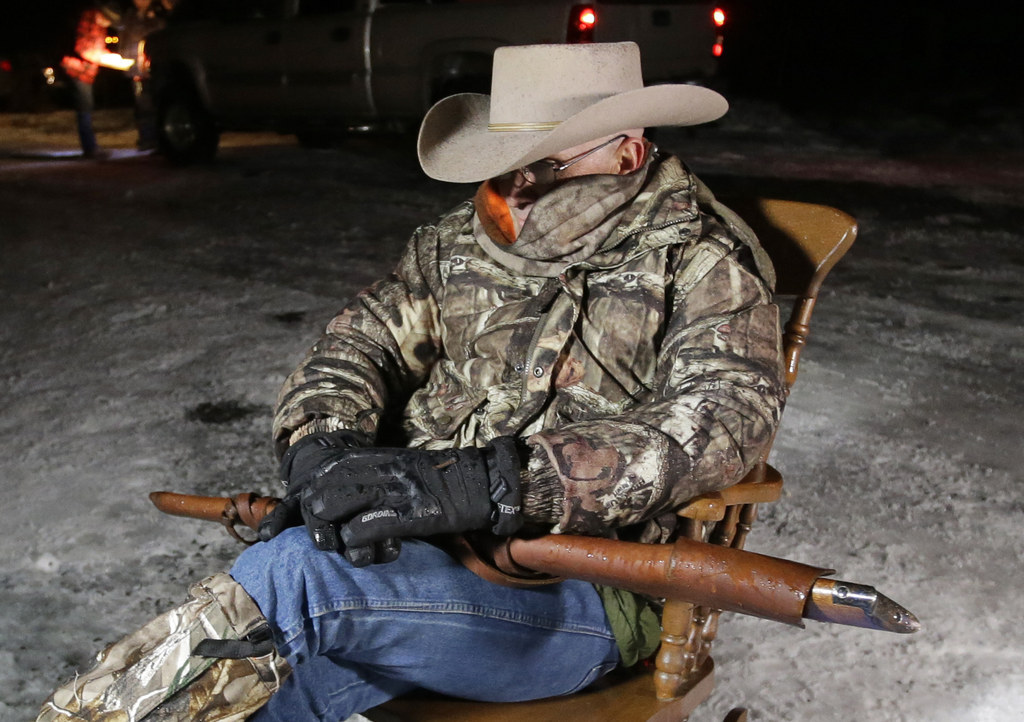
Killing people is acceptable in the book when it comes to defending property, or meting out frontier justice.
The entire novel is an argument in favor of the "live free or die" mantra, and it is peppered with passages making the point that "a man had the right to defend his 'life, liberty and property.'"
"Without the right and control of property there was no freedom," the protagonist Jake Bonham thinks at one point. "Here I would live free or die. I would not be the first in my family to die in a last stand for freedom."
Bonham shoots plenty of people throughout the book, including a handful of DHS agents and a cannibal. One lengthy chapter, "The Long Valley War," tells the story of a brutal battle in which Bonham faces, and fires, a hail of bullets.
"I did not cease to fire and the skill that was developed over a lifetime of shooting at game on the run paid off," Bonham thinks. "Men were dropping and I was on my second magazine but they were closing fast as they kept repeating the four-second charges."
But perhaps the most striking killing is that of Ann Rafferty, the mayor of Orderville, Utah. Rafferty — who ultimately comes to epitomize the ills of government — tried to enforce a series of laws the ranchers saw as unjust, including gun control and the forced sharing of resources such as food among community members.
Finally, near the end of the story, Bonham rides up to Rafferty on his horse, accuses her of capital murder, lassos her neck, and hangs her from a barn rafter in front of a crowd.
"With a quick jab of my spurs, my horse jumped forward and the rope zipped over the rafter, pulling Ann's body off the ground," the story recounts. "It was not pretty and it was not quick."
Bonham eventually becomes troubled by the killing, but only because "she was a woman."
Many of the scenes in the book ultimately bear a resemblance to the settings and conditions of the Oregon standoff.
Several of the rural towns in the novel — which are real places — are described as once-prosperous communities that suffered economically as a result of government involvement.
"But the government had gotten involved," Dan, a son in the Bonham family, laments at one point. "The environmentalists had successfully shut down the logging. The President's Secretary of Interior had shut down the mining. The EPA, the Environmental Protection Agency, had shut down the oil refinery."
That happens to be a very similar argument to the one the Oregon occupiers are making. During news conferences, Ammon Bundy — the public face of the standoff — has described the Burns, Oregon, area as unable to fully take advantage of its economic resources thanks to government meddling. He has also claimed that people who formerly worked in other industries, such as ranching, have ended up taking government jobs.
Complaints about government land management are also what prompted Bundy's father, Cliven Bundy, to lead a standoff with federal authorities in 2014.
The parallels between the book's settings and Oregon also extend to plot points. In Fredonia, Arizona, for example, there is an "uneasy truce" between armed ranchers and law enforcement.
"The parking lot, between the fire station and the city building, had five horses saddled and standing on the west end of the lot," the novel recounts. "The horses were being held at the ready by two young cowboys each holding hunting rifles. Open rifles in a town, major gun violations now."
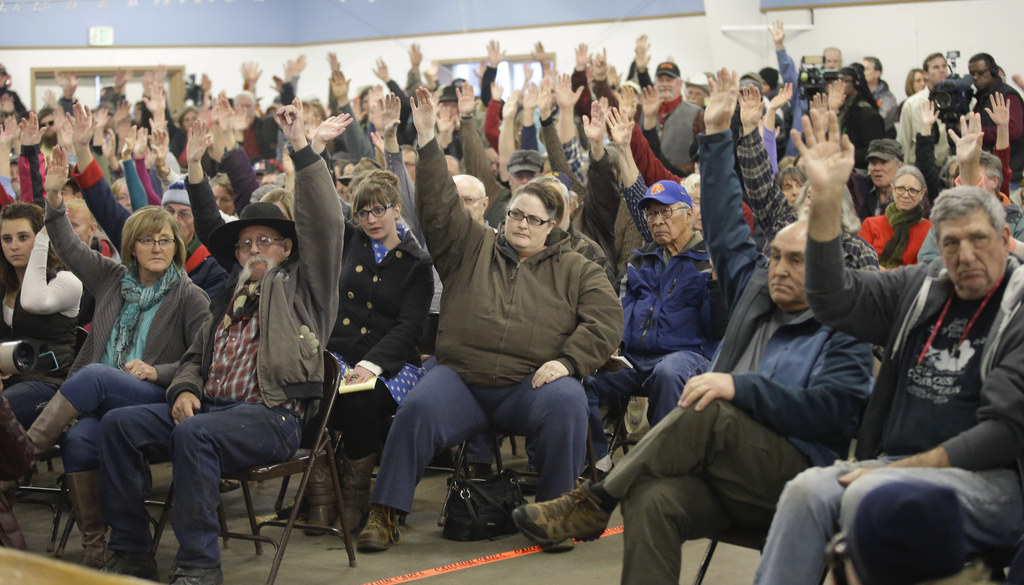
Later, in Orderville — a town located on the back side of Zion National Park — the community holds a meeting to discuss resources and a divide between the armed ranchers and everyone else. It's reminiscent of the meeting held in Oregon last week where residents mostly called for the occupiers to leave. In the novel, however, it ends with Jake Bonham taking over the gathering.
"It was against federal, state, county and city laws to carry a firearm but I walked in carrying my AR-15," Bonham narrates. "As usual, I had my great grandfather's cold revolver strapped to my hip."
